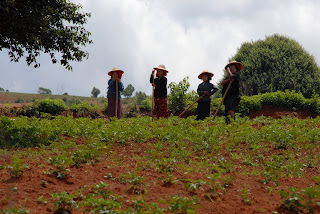The illusion of separation has been constant in my awareness since arriving in Myanmar, this most underdeveloped country of all of SE Asia. Each day I grow more and more appreciative that while the circumstances of my life are clearly very different from the day to day life that most Burmese live, still at the core we are fundamentally the same. Our differences are primarily cultural. Yet I have had the significant advantage of health, education and wealth. These create a difference but need not create a distance.
That said, we are all fundamentally the same. The pleasure, pain, suffering, and joy that we experience are the human condition made manifest. Even given the number of seeming differences in the circumstances of our lives, we are not separate. We are all one and the same in our humanity. The separation we create in our consciousness is but an illusion. I now see Burma (Myanmar) through this lens.
I am the woman washing clothes in the murky waters of the mud rushing river.
I am the infant sleeping in the marketplace next to my mother's array of vegetables for sale.
I am the vendor squatting on a brick in the mud and slime of the meat market, selling pieces of raw chicken in the heat of the morning.
I am the young boy looking wide-eyed into the windows of cars hoping to sell his jasmine flower necklaces to the drivers to dangle from their car mirror or for an offering to the Buddha.
I am the adolescent mother with a nursing babe at her breast asking for a handout as she weaves her way from car to car through the traffic-jammed intersection, hoping to curry the sympathy of those more fortunate.
I am the barefoot ox cart driver bumping along the deeply rutted, red-earthen roads with a load of manure to be spread for fertilizer in the fields.
I am the young woman, face delicately painted with thanaka, jammed into a crowded bus, going off to work in the heat, with tin tiffin pail of lunch prepared early in the morning.
I am the rice farmer at the back of a wooden plow prodding the oxen to till the fields to prepare for another planting.
I am the old woman bent over in the rice paddy sewing rice in the muddy water.
I am the monk sitting before the Buddha sonorously chanting prayers at 5 am for peace and mankind.
I am the novice monk clanging my cymbal, alerting almsgivers of my daily need to fill my bowl.
I am the temple tout trying to peddle my wares to the tourists, hoping their eyes glance upon something of interest to give me lucky money.
I am the work-worn woman hoeing the potato fields, supported in my sweat-filled labor by the songs of my neighbors who toil with me.
I am the bus driver with steely nerves, entrusted with the passage of travelers on roads rutted, rocky and treacherous, with a vehicle that lurches between gears, on threadbare tires, delivering my passengers and their baggage, goats, and chickens to their destination.
I am the smiling taxi driver lost in finding the destination that these foreigners wish to go to, but anxious to please nonetheless.
I am the busy waiter patiently serving noddle soup to foreigners in the guest house. They all ask the same questions.
I am the old woman sitting on a wooden platform, bones aching, eyesight blurred, observing the daily cycle of life unfold in her multi-generational family’s bamboo hut.
I am the young girl at the temple seeking a small kyat offering for a plastic bag the foreigner will use for the requisite removal of shoes before entering the temple.
I am the gleeful boy aglow with joy, blowing a plastic whistle the foreigner gave me.
I am the new father, betel red encrusting my toothy smile, holding my infant son up to be admired.
I am the monk eating my one meal of the day provided by the almsgivers who know that my prayers will further their divine standing.
I am the fisherman rowing with my foot and leg wrapped around the wooden oar on my shallow teak boat hoping for a good catch today.
I am the young woman sitting with dozens of others sweating in the 105 degree sauna-like conditions of a dark room, plastic shielding out any moisture, pounding gold leaf to wafer thinness for temple offerings, hour upon hour, for $1/day.
I am the entrepreneur guide who has learned enough tourist English to show the foreigners all the temples, Buddhas and attractions of this richly diverse country.
I am the tender in charge of the huge snake kept in the temple where worshipers come to pray.
I am the young artist carving a stone Buddha in the dust and heat, my hammer and chisel delicately creating the peacefulness and serenity of his enlightened face.
I am the supplicant kneeling in the temple before the Buddha, making an offering while silently praying that I can feed my family.
I am the Buddha sitting serenely in the temple, accepting the obeisance of the faithful, a conduit for their prayers and hopes.















